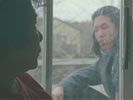Eye For Film >> Movies >> The Betrayal (2008) Film Review
It’s not often that you get to see a documentary filmed over 23 years. Veteran cinematographer Ellen Kuras has woven together personal and historical archive footage to tell the story of Thavi and his family, Laotian exiles in America.
The film opens with beautiful shots of the Laos countryside and readings from traditional Laotian poems, then Thavi interviewing his elderly mother. She tells how she married at 16 and bore her soldier husband ten children. But when the Americans spread their Vietnam war into Laos and her husband joined the American side, she was left to bring up her family alone. The Americans pulled out of the country without warning, Thavi’s father was taken away for “re-education” and the family found themselves shunned by their neighbours, regarded as enemies.

This part of her testimony is compelling. With accompanying archive clips, Thavi’s mother tells how afraid she was in those nights, when she would hear the deep, low rumble of the army vehicles entering their village, knowing they might be the next to be taken away.
The family knew they couldn’t stay in Laos, and it was decided that Thavi, the eldest boy, should leave first. So as a young teenager he swam across the Mekong to Thailand, where he was later joined by the rest of his family. But, forced to leave in a hurry, they had to leave two sisters behind.
Thavi’s mother chose America as their country of refuge because she thought the Americans had been good to her husband. Like so many before her, she had heard about the land of plenty. As their plane landed in America she said “I thought I was going to step into heaven.”
The reality, of course, was very different. Arriving in Brooklyn, they were convinced at first that they had come to the wrong continent, not having any idea of the racial diversity of New York. Their experience as immigrants was that of most: poor housing conditions, prejudice, the violence of gangs and for Thavi’s mother, the increasing alienation of her children.
The title of the film refers not only to the betrayal by the Americans of those Laotians who helped them, but to a further, more personal betrayal which becomes apparent as the story unfolds.
At the Sheffield Doc/Fest we had a surprise at the end of the screening as Thavi himself appeared and we were able to question him about the making of the film. He was greeted with warm applause, and the first question was of course about how he came to be involved and how such a film could be made over such a long timespan.
Thavi told us more about his early survival in New York, how he found work, learned the language etc. He said that no one knew what he meant when he said he was from Laos, no one had heard of the place. But then one day he had a call from Ellen, who wanted to make a film about Laos and was seeking out people to talk with. When they got together and she heard his story she decided to make the story about him.
This was in the Eighties, and the filming began, using video to reconstruct earlier parts of the story, such as the arrival of the family in New York. Thavi says he was a fan of MTV, and this explains some of the dizzying camerawork, rather overdone. As the years went by and Ellen was increasingly busy on other projects, Thavi became more involved in putting the film together and eventually became co-director.
Someone asked how, after so many years, they decided it was time to complete the film. Thavi said that although they had a lot of footage of his mother, they realised, after about 20 years, that they had never given her the chance to tell her story in her own words. So Thavi began to interview her, and when her full, tragic story came out the focus shifted to her and they knew they had their film.
This is a very moving story, and I wish I could give the film more praise. But I did find many sequences too long and drawn out, particularly the last ten minutes of the film. The editing, or lack of it, lets the film down. There are too many shots of Thavi’s mother sitting quietly in her apartment and footage of a funeral which goes on for far too long.
However, one must give credit to Thavi for persisting for so long with his project. The subject of exile is worthy of exploration, and it was a bonus for us having Thavi there to talk about it. He is now engaged in making a film about domestic violence, staying with his strong interest in family issues.
Asked if he might ever consider going back to live in Laos, he said “No. I still don’t trust the government.” His home is now America, where most of his family remain. It is touching that, after all that has happened to him in a family so torn apart, he still regards his father as a hero and says “What have we got in America if we haven’t got family?”
Reviewed on: 09 Nov 2008
















